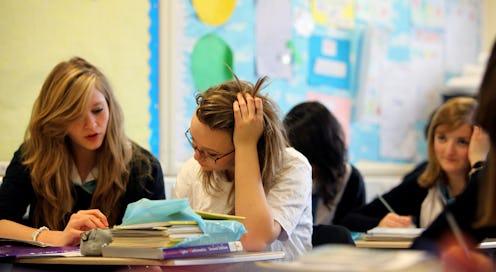Books
Texas School District's New Rules On Book-Banning
I've often speculated that, from the point of view of individual teachers, principals, and school librarians, attempts to ban books from classrooms or libraries probably feels less like an epic battle for the cause of free speech and more like an aggravating and annoying saga of having to deal with troublemaking parents — which is why it's probably a good thing that a Texas school district is revising its policy on reviewing complaints about books. Because nobody has time to fight about this stuff for months, especially not when they're supposed to be, you know, educating your children.
Highland Park High School made headlines last year when they suspended seven books following parent complaints, including Sidharthaby Herman Hesse, Song of Solomon by Toni Morrison, An Abundance of Katherines by John Green, and one of the most commonly banned and challenged books in the country, The Absolutely True Diary of a Part Time Indian by Sherman Alexie. Although the district insisted they weren't banning books — all of the titles were still available in the library, though teachers were no longer allowed to teach them — lots of people were still rightly upset. The school eventually agreed to let the books to return to the classroom.
But because we are talking about the type of parents who want to not only control their own children's reading material, but that of every other child in their school district, the issue did not go away and a new challenge was filed against one of the seven books, The Working Poor: Invisible in America by David Shipler.
That's why the school board has now voted to update their policies for parent complaints against books. Here are the new rules, according to Dallas News:
If a committee decides to restrict a challenged book’s use, a parent of a student who is in the relevant class or preregistered for the class will have the right to appeal.
Committees that review challenged books or materials may include juniors and seniors who have previously studied them, in addition to parents and staff.
Committees “shall weigh the strengths and weakness of the challenged material as a whole rather than on passages or sections taken out of context.”
Teachers in the English Department will not use an approved book list. Instead, they will propose books for the curriculum and the books will go through an approval process. If they anticipate controversy, a literature review committee of district employees can refer the book to a community feedback group for extra input.
Selected book titles and materials will be posted online before the start of the school year.
An individual who objects to a book or material can file a challenge up to 21 days after the date of its posting.
Overall, these seem like the sensible type of solutions that school districts all over should implement, though I'd also keep an eye on what sorts of people are placed onto these committees — as much as I understand the need for community input in education, it can be a double-edged sword if the participants aren't fair and balanced.
The bottom line, though, is that teachers should be trusted to determine what's appropriate for their classrooms, students shouldn't be regarded as impressionable idiots without critical thinking skills, and school administrators shouldn't have to spend all their time fighting the same battles over and over again. The community should have input, but it should be just that: input. Because what's the point of appointing all these qualified people to educate your kids if you're just going to try second guessing them all the time?
Plus, doesn't everyone have better things to be doing than keeping books away from kids? Like maybe... reading. Just an idea.
